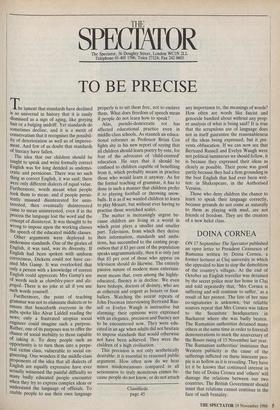SPECT THE AT OR
The Spectator, 56 Doughty Street, London WC1N 2LL Telephone 01-405 1706; Telex 27124; Fax 242 0603
TO BE PRECISE
he lament that standards have declined is so universal in history that it is easily dismissed as a sign of aging, like greying hair or a bulging midriff. Yet standards do sometimes decline, and it is a merit of conservatism that it recognises the possibil- ity of deterioration as well as of improve- ment. And few of us doubt that standards of literacy have fallen. The idea that our children should be taught to speak and write formally correct English was for long derided as undemo- cratic and pernicious. There was no such thing as correct English, it was said; there were only different dialects of equal value. Furthermore, words meant what people took them to mean: and if people persis- tently misused disinterested for unin- terested, then eventually disinterested came to mean uninterested, even if in the process the language lost the word and the concept of disinterest. It was thought to be wrong to impose upon the working classes the speech of the educated middle classes.
Other arguments were deployed to undermine standards. One of the glories of English, it was said, was its diversity. If English had been spoken with uniform correctness, Dickens could not have cre- ated Mrs Gamp. It was overlooked that only a person with a knowledge of correct English could appreciate Mrs Gamp's use of words such as chimbley-piece and dis- Poged. There is no joke at all if you use such words yourself. Furthermore, the point of teaching grammar was not to eliminate dialects or to ensure that henceforth everyone in the pubs spoke like Alvar Liddell reading the news: only a frustrated utopian social engineer could imagine such a purpose. Rather, one of its purposes was to offer the chance of social mobility to those capable of taking it. To deny people such an opportunity is to turn them into a _perpe- tual victim class, vulnerable to social en- gineering. One wonders if the middle-class proponents of the idea that all dialects of English are equally expressive have ever actually witnessed the painful difficulty so many badly educated people encounter when they try to express complex ideas or understand the language of officials. To enable people to use their own language properly is to set them free, not to enslave them. What does freedom of speech mean if people do not learn how to speak? Alas, pseudo-democratic rot has affected educational practice even in middle-class schools. As staunch an educa- tional reformer as Professor Brian Cox fights shy in his new report of saying that all children should learn poetry by rote, for fear of the advocates of 'child-centred' education. He says that it should be confined to children capable of benefiting from it, which probably means in practice those who would learn it anyway. As for the formal teaching of grammar, it has to done in such a manner that children prefer it to playing football or throwing snow- balls. It is as if we wanted children to learn to play Mozart, but without ever having to practise those wretched scales. The matter is increasingly urgent be- cause children are living in a world in which print plays a smaller and smaller part. Television, from which they derive their information, standards and ambi- tions, has succumbed to the canting prop- osition that if 83 per cent of the population speaks ungrammatically, then it is only just that 83 per cent of those who appear on television should do likewise. The entirely passive nature of modern mass entertain- ment means that, even among the highly- educated, fluency is in decline. We even have bishops, doctors of divinity, who are as coherent and cogent as boxers or foot- ballers. Watching the recent repeats of John Freeman interviewing Bertrand Rus- sell or Evelyn Waugh is instructive but alarming: their opinions were expressed with an elegance, precision and fluency not to be encountered now. They were edu- cated in an age when adults did not hesitate to impose standards that would otherwise not have been achieved. They were the children of a high civilisation.
This precision is not only aesthetically desirable: it is essential to reasoned public argument. How often now do we hear minor misdemeanours compared in all seriousness to truly monstrous crimes be- cause people do not know, or do not attach any importance to, the meanings of words? How often are words like fascist and genocide bandied about without any prop- er analysis of what is being said? It is true that the scrupulous use of language does not in itself guarantee the reasonableness of the ideas being expressed, but it pre- vents obfuscation. If we can now see that Bertrand Russell and Evelyn Waugh were not political luminaries we should follow, it is because they expressed their ideas as clearly as possible. Their prose was good partly because they had a firm grounding in the best English that had ever been writ- ten: in Shakespeare, in the Authorised Version.
Those who deny children the chance to learn to speak their language correctly, because gerunds do not come as naturally to them as playing with mud, are not friends of freedom. They are the creators of a new helot class.






















































 Previous page
Previous page